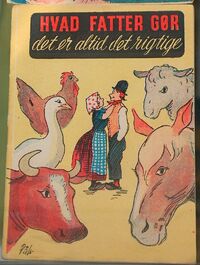
Front cover of a Danish picture book edition of "What the Old Man Does is Always Right".
"What the Old Man Does is Always Right" (Danish: "Hvad Fatter gjør, det er altid det Rigtige" or "Hvad Fatter gør, det er altid det Rigtige") is a humorous short story for children by the Danish author Hans Christian Andersen. It was first published in 1861 as part of the anthology New Fairy Tales and Stories. Second Series. First Collection (Danish: Nye Eventyr og Historier. Anden Række. Første Samling). It is based on a Norwegian folktale called "Gudbrand i Lia" or "Gudbrand on the Hillside". In the opening and closing paragraphs of "What the Old Man Does is Always Right", Andersen acknowledges that he heard the story when he was a boy. Similar stories exist in English and German folklore. A similar fairy tale, called "Hans in Luck", is included in Children's and Household Tales, the 1812 anthology compiled by the Brothers Grimm. Unlike Andersen's "What the Old Man Does is Always Right", the Grimms' "Hans in Luck" does not have an unambiguously happy ending.
The title character and protagonist of "What the Old Man Does is Always Right" is a farmer. His wife has complete trust in him because she believes that every decision that he makes is always the best possible decision. The plot is set in motion when the farmer's wife tells him to exchange their horse for something more useful. After a series of trades, the farmer ends up with a bag of rotten apples. Two wealthy Englishmen make a bet that the farmer's wife will be angry when he comes home with the rotten fruit. The farmer is happy to accept the bet because he is certain that his wife will be pleased.
Plot[]
Although their horse is the most useful possession that an old farmer and his wife have, the wife is certain that they can exchange it for something more useful. She tells her husband to take their horse to the fair in the city where he can either sell the animal or swap it for something else. She says to her husband that she does not mind what he gets because, "What the old man does is always right".
On the road to the city, the farmer exchanges the horse for a cow. He exchanges the cow for a sheep. He exchanges the sheep for a goose and he exchanges the goose for a hen. On arrival in the city, he goes into an inn. He sees the innkeeper with a bag full of rotten apples which he is going to feed to his pigs. The farmer remembers that, the previous year, his apple tree only produced one apple. His wife considered that apple to be a sign of prosperity and insisted that they kept it until it went rotten. The farmer is certain that his wife will see a whole bag full of rotten apples as a sign of much greater prosperity. The farmer gives the innkeeper his hen in exchange for the rotten apples. He puts the bag next to a stove and the apples start to cook.

The two Englishman see that the farmer's wife is very pleased with him. 1871 illustration by Lorenz Frølich.
Two wealthy Englishmen are also at the inn. They hear the hissing sound of the cooking apples and ask what is making the noise. The farmer tells them. He goes on to say how he exchanged his horse for a cow, exchanged the cow for a sheep, exchanged the sheep for a goose, exchanged the goose for a hen and exchanged the hen for the rotten apples. The Englishmen are certain that, when the farmer gets home, his wife will be so angry that she will beat him. The farmer replies that his wife will be pleased and will kiss him. The Englishmen tell the farmer that they will give him a bushel of gold if his wife kisses him when he gets home. The farmer accepts the bet. He tells the Englishmen that they can have the rotten apples, himself and his wife if he loses.
The two Englishmen go back home with the farmer in the innkeeper's carriage. The farmer tells his wife how he exchanged the horse for a cow, exchanged the cow for a sheep, exchanged the sheep for a goose and exchanged the goose for a hen. The farmer's wife praises the farmer for making the right trade each time. When the farmer says that he exchanged the hen for a bag of rotten apples, his wife kisses him. She says that she wanted to make an omelette for the farmer's dinner. She went to the schoolmistress for some chives. The schoolmistress refused to give her any, saying that the farmer's wife could not give her anything in return, not even a rotten apple. The farmer's wife is delighted that she can now give the schoolmistress a bag full of rotten apples.
The Englishmen are impressed by the positive attitude of the farmer's wife and happily hand over a bushel of gold.
External links[]
- Versions of Hans Christian Andersen's "What the Old Man Does is Always Right' in Danish and English on Wikisource.
- Public domain audiobook of "What the Old Man Does is Always Right" on YouTube.
